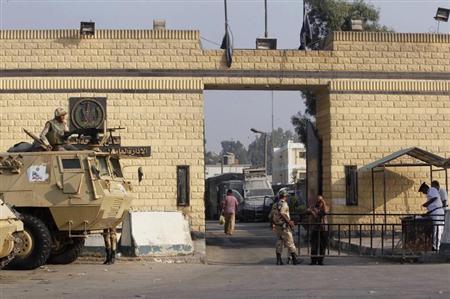Latest NEWS
- Aswat Masriya, the last word
- Roundup of Egypt's press headlines on March 15, 2017
- Roundup of Egypt's press headlines on March 14, 2017
- Former Egyptian President Hosni Mubarak to be released: lawyer
- Roundup of Egypt's press headlines on March 13, 2017
- Egypt's capital set to grow by half a million in 2017
- Egypt's wheat reserves to double with start of harvest -supply min
- Roundup of Egypt's press headlines on March 12, 2017
Rightists question effectiveness of planned inspection visits to Aqrab prison

Egyptian army soldiers guard with armoured personnel carriers (APC) in front of the main gate of Torah prison on the outskirts of Cairo, August 22, 2013. Reuters/Louafi Larbi
By Sara Khorshid
CAIRO, Jan 6 (Aswat Masriya) – Rights activists were quick to criticise on Wednesday the "uselessness" of the latest prison inspection visit made by the state-affiliated National Human Rights Council (NCHR), because the ministry of interior had decided on its date.
Ragia Omran, a member of the NCHR herself, told Aswat Masriya that the council’s visits to prisons “do not have the element of surprise”, with the ministry of interior having the upper hand on when delegations may inspect prisons and which prisons they may visit.
Omran said that she was not allowed to join an NCHR delegation that visited the Torah High Security Prison, commonly dubbed Aqrab (scorpion), on Tuesday.
“What is so scary about me visiting? Was not enough that I have not been informed of the last visit which turned out a scandal for the regime? Don’t they ever learn?” she wrote in a facebook post that sparked a media frenzy on Tuesday.
“The prison administration has been preparing for this visit since some time, trying to improve conditions. Let us wait and see if that improvement will continue after the visit. We know that prisoners have been threatened if they complained to the delegation,” she added.
Less than a day after Omran’s post, another NCHR member, Nevine Mossaad, who was on the delegation that visited Aqrab, wrote a facebook post saying that council’s secretary general Mokhles Qutb, who is also a former diplomat, called Omran to ask her if she wanted to join the delegation but she did not answer her phone and therefore her name was not added to the list sent by the council to the interior ministry ahead of the visit.
When Omran headed with her colleagues to Aqrab on the planned day of the visit, she was told at the prison's gate that her name was not on the list provided by the council to the ministry beforehand.
An interior ministry official told Aswat Masriya that the prison’s administration showed “no intransigence” in dealing with Omran, and it “welcomed the human rights delegation” to the prison.
The source said that Omran’s name was not among the list of names that the council had provided to the ministry “around 48 hours ahead of the visit”, adding that the ministry always “coordinates with the human rights council” amid such visits.
But Omran believes that neither the council’s leadership nor the interior ministry genuinely wanted her to inspect Aqrab. She told Aswat Masriya that the council’s head Mohamed Fayek, a former Gamal Abdel Nasser-era intelligence officer, could have managed, through a phone call, to add her name to the list at short notice and convince the ministry to let her enter the prison with her colleagues, but he did not.
“This is not the first time that I was not allowed to join a delegation visiting Aqrab,” she added, referring to a previous NCHR visit to the same prison in August 2015.
The report issued by the council following August’s visit was condemned by various political and rights groups as "biased" and not comprehensive.
After facebook posts by NCHR members Omran and Mossaad, the council issued on Wednesday a much-awaited statement saying it found in its second visit that the concerns it had expressed following August’s inspection have been positively dealt with by the prison’s administration, except with regard to the duration of family visits to inmates, which the council recommended it be increased.
Mossad said on her facebook post that Ragia gave the NCHR delegation that visited Aqrab a list of 10 names of prisoners whose families say are subjected to inhumane conditions in the prison or are not provided with needed medical treatment. But the council’s statement said that some of the inmates “refused” to meet the delegation.
Negad El Borai, a former NCHR member, said that he could not comment on the statement because he was not on the delegation and did not see for himself what the situation was like in Aqrab. But he also downplayed the effectiveness of all pre-planned visits in unveiling real prison conditions. “I am against such visits. I have been always against them even during Mubarak’s era,” he told Aswat Masriya. Prisons’ administrations can always “turn prisons into five-star (hotels)” once they are notified of inspection visits beforehand.
Former president Hosni Mubarak was toppled after an uprising against his rule in January 2011.










